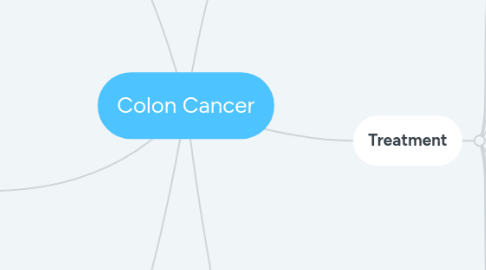Colon Cancer
저자: Marilou Loisel

1. Pathophysiology
1.1. Colon is part of the large intestine & is about 5 feet long. Water is adsorbed here. Some nutrients & electrolytes are removed here.
1.2. Chronic inflammation creates a permissive tumor-progressing environment.
1.3. Chronic inflammation can be induced by: bacteria, viruses, autoimmune processes, toxins, and infiltrating immune cells.
1.4. Chronic inflammation involves continuous presence of: cytokines, chemokines, reactive oxygen species, oncogenes, cyclooxgenase-2, 5-lipoxygenase, matrix metalloproteinases, & essential transcription factors.
2. Causative Factors
2.1. Older age, over 50
2.2. African-American have a higher incidence than other races
2.3. Inflammatory Intestinal Conditions, such as Crohn's Disease & Ulcerative Colitis, increase risk of developing colon cancer.
2.4. Personal & Family History. Two inheritable conditions= Hereditary nonpolyposis colorectal cancer (HNPCC) & Familial adenomatous polyposis (FAP).
2.5. Low Fiber, High Fat Diet
2.6. Sedentary Lifestyle
2.7. Diabetes
2.8. Obesity
2.9. Smoker
2.10. Alcohol use, especially heavy alcohol use
3. Symptoms
3.1. Early Symptoms: Diarrhea; Constipation; Alternating Diarrhea & Constipation; Blood in Stool; Abdominal Bloating; Pain, Aches, or Cramps in the stomach that won't go away; Unknown weight lose.
3.2. Change in bowel habits longer than 4 weeks
4. Treatment
4.1. There is NO cure for colon cancer.
4.2. Surgery for early stage colon CA= removal of polyps during colonoscopy; Endoscopic mucosal resections; Minimally invasive surgery.
4.3. Surgery for invasive colon CA= Partial Colectomy; Surgery to create way for waste to leave your body; Lymph node removal.
4.4. Surgery for Advanced CA= surgery to relieve symptoms, such as bowel blockage.
4.5. Chemotherapy
4.6. Radiation Therapy
4.7. Targeted Drug Therapy
4.8. Immunotherapy
4.9. Palliative Care
5. Diagnostic Tests
5.1. Stools Tests: Guiac-based Fecal Occult Blood test (gFOBT)= once a year; Fecal Immunochemical Test (FIT); FIT-DNA test (or stool DNA test)= every 1-3 years
5.2. Flexible Sigmoidoscopy
5.3. Colonoscopy
5.4. CT Colonoscopy (Virtual Colonoscopy)
6. Facts & Common Findings
6.1. Colon Cancer= 3rd leading cause of death in USA
6.2. Stage l= 85-90% survival rate
6.3. Stage ll= 55-80% survival rate
6.4. Stage lll= 40% survival rate
6.5. Stage lV= 10% survival rate
6.6. 67.3% of adults ages 5--75 have up-to-date screening
6.7. 25.6% of adults ages 50-75 have NEVER had any colorectal cancer screening.
6.8. More adults with insurance (71.1%) have up-to-date screening than without (36.3%)
6.9. More adults aged 65-75 have up-to-date screening (78.4%), than those aged 50-64 (61.8%).


